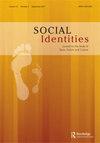A short philosophical guide to the fallacies of love
IF 0.7
Q3 ETHNIC STUDIES
引用次数: 1
Abstract
Love, as the most intense and pervasive of human feelings, cannot deny in it the existence of love beliefs, that is, beliefs about one’s own love and that of the others’ love, thereby rendering the imagination of a loveless world impossible. This book, the authors clarify, originates in a series of discussions surrounding the illusions in love in their own lives and that of their friends. These conversations are given a theoretical form in this book as an epistemology of love. The authors thereby introduce this epistemology of love as a reflection on the groundedness of love beliefs, focusing mainly on the kind of love that is not grounded. The illustration of this takes the form of sketches of fictional characters derived from authors’ own friends, fables, myths, and everyday stereotypical situations to a large extent. The first chapter begins by introducing the book’s premise based on eros, which is romantic love characterized by passion and desire for a lover, distinguished from philia, love characteristic of affection for one’s friends or family. It distinguishes romantic love from ‘conjugal love,’ or marriage, a more stable form of attachment. This romantic love is a dispositional state, an attitudinal property that the lover comes to possess for their beloved. It is typically encompasses three features; the physical reactions caused on interaction between lover and their beloved, the desire for prolonged intimate and sexual contact, and the thought and act of doing ‘strange’ things for the sake of the beloved, that one would not do otherwise. Thus the common properties of love originating from this disposition state are, firstly, love being passionate, is not an active choice one makes willfully. Second, is it not a characteristic feeling. Third, like any passionate feeling, love varies in its intensity and strength and is not a stable characteristic emotion that lasts in the same state throughout. Fourth, love is non-symmetric, one does not love with the guarantee of being loved in return or with the same intensity. Hence, the inevitable possibility of a broken heart. The second chapter focuses on the psychological mechanism of rationalization or the act of providing reasonable motivation to form unjustified love beliefs. The reasonable motivations themselves are not reasonable because the lover does not recognize the underlying causes of their actions. It talks about fallacies that elucidate the effects of the rationalization of love关于爱情谬误的简短哲学指南
爱作为人类情感中最强烈、最普遍的一种,它不能否认爱的信仰的存在,即对自己的爱和他人的爱的信仰,从而使人们无法想象一个没有爱的世界。作者澄清说,这本书源于一系列围绕他们自己和朋友生活中爱情幻想的讨论。这些对话在本书中被赋予了一种理论形式,作为爱的认识论。因此,作者引入了这种爱的认识论,作为对爱信仰的基础性的反思,主要关注没有基础的爱。这方面的插图采用了虚构人物的素描形式,这些人物在很大程度上来源于作者自己的朋友、寓言、神话和日常刻板印象。第一章首先介绍了这本书基于性爱的前提,即以对爱人的热情和欲望为特征的浪漫爱情,区别于以对朋友或家人的爱为特征的恋。它将浪漫爱情与“夫妻爱情”或婚姻区分开来,后者是一种更稳定的依恋形式。这种浪漫的爱是一种性格状态,一种情人为他们所爱的人而拥有的态度财产。它通常包括三个特征;情人和爱人之间的互动引起的身体反应,渴望长时间的亲密和性接触,以及为了爱人而做“奇怪”事情的想法和行为,否则是不会做的。因此,源于这种性格状态的爱的共同特征是,首先,爱是充满激情的,不是一个人自愿做出的积极选择。第二,这不是一种特有的感觉吗。第三,就像任何激情一样,爱的强度和强度各不相同,并不是一种稳定的、持续不变的情感。第四,爱是非对称的,一个人的爱没有得到回报的保证,也没有同样的强度。因此,心碎的可能性是不可避免的。第二章着重探讨合理化的心理机制,即为形成不合理的爱情信念提供合理动机的行为。合理的动机本身是不合理的,因为爱人没有认识到他们行为的根本原因。它谈到了阐明爱情合理化影响的谬论
本文章由计算机程序翻译,如有差异,请以英文原文为准。
求助全文
约1分钟内获得全文
求助全文
来源期刊

Social Identities
ETHNIC STUDIES-
CiteScore
2.00
自引率
0.00%
发文量
22
期刊介绍:
Recent years have witnessed considerable worldwide changes concerning social identities such as race, nation and ethnicity, as well as the emergence of new forms of racism and nationalism as discriminatory exclusions. Social Identities aims to furnish an interdisciplinary and international focal point for theorizing issues at the interface of social identities. The journal is especially concerned to address these issues in the context of the transforming political economies and cultures of postmodern and postcolonial conditions. Social Identities is intended as a forum for contesting ideas and debates concerning the formations of, and transformations in, socially significant identities, their attendant forms of material exclusion and power.
 求助内容:
求助内容: 应助结果提醒方式:
应助结果提醒方式:


